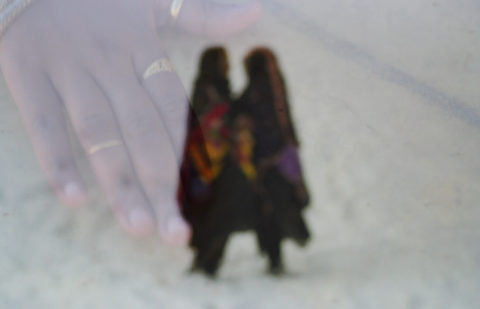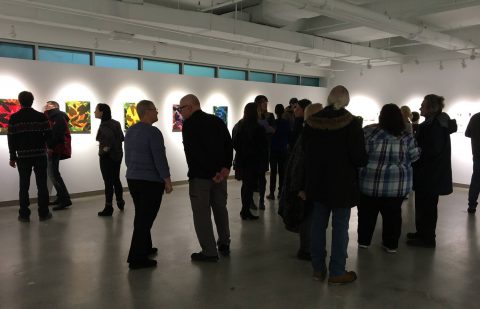Sally Thurlow is our Gallery A ArtLab Artist in Residence from March 2 to 27. During her residency, she will be working on a series of sculptures and paintings exploring subconscious themes on major change, dislocation, and relocation which have personal meaning and may also relate to the universal, continuing, and recurring theme that refugees are always on the move. However, this project is only just getting underway, so it is open to huge change…
In an earlier Reclamation sculptural series she stated “Memory is embedded, the process of ageing ennobles. From being tossed away or lost, then washed up, then recovered and restored to dignity and purpose, these driftwood forms represent a deeply human longing for reclamation. Like us, they are simply travellers through time, looking for meaning. How have we come here? How do we react to our environment?” Her attention now is more toward envisioning forms that speak of intense emotional states – making visible the invisible, allowing for new possibilities. She has moved from placing her figures to blend into the environment to making them stand out. Consequently, Thurlow started working with paints, stains, and manufactured additions to her figures. Here she will be working on the second sculpture of a trio.
As a member of the IRIS Group, Thurlow’s residency in the ArtLab is completed in conjunction with the Gallery A exhibition IRIS at 20. We sat down with Sally to learn more about what she has been up to during her residency.
The RMG: Hi Sally! Please tell us a bit about yourself?
Sally Thurlow: I was born and raised in Toronto but moved to the lakeshore of Newcastle 30 years ago with my young family and now live by the Whitby lakeshore. Observing daily such a great body of water has been very influential on my life and work. I received my BA majoring in Fine Arts from U of T in 1999 finishing at Trent U for some Environmental Science and Cultural Studies courses, also very influential, plus earlier significant studies at OCA. In 2006 the RMG gave me my first solo show called Canoe Dreamings and helped me get it to travel to five other galleries in Ontario. The Ontario Arts Council awards were very helpful for this exhibition from a starting boost to crating expenses for shipping. I have been fortunate to be part of the Iris Group in Durham Region and The Red Head Gallery in Toronto. Both are great groups of artists to collaborate with. I have since had solo shows at The Visual Arts Centre in Bowmanville and The Red Head Gallery, and have been involved in many group shows. I am very pleased that the RMG now has one of my works in their permanent collection.
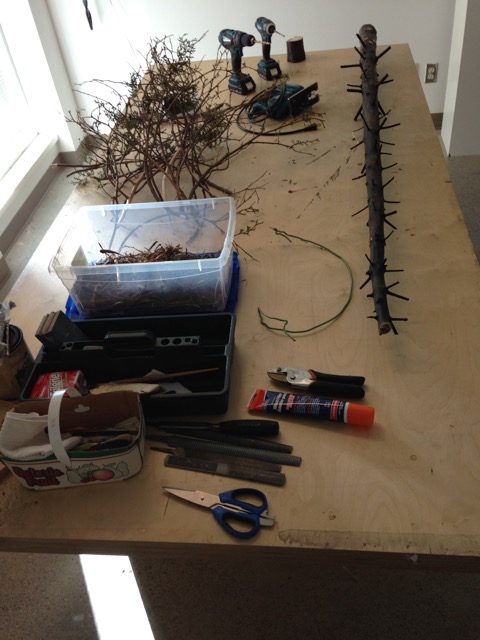
Sally Thurlow: Day 1…where I started from, a pruned and stained evergreen,
fresh cut cedar branches
RMG: Why were you interested in Gallery A’s Art Lab residency? What will you be making while working as an artist in residence?
ST: I thought it would be interesting to see and hear the flow of visitors through The Iris Group’s Iris at 20 anniversary show while I worked around the corner. I enjoy engaging with people about all the work and if they come in to the studio space, we can talk about my process and some may even critique it. Beyond this, the RMG is a great gallery to work in.
I decided I would work on a sculptural piece that I hope will be going in to the Bluseed Studio Gallery in Saranac Lake – a 5 person show curated by Margaret Rodgers, former Visual Arts Centre curator and director, and Iris Group founder/member. Also it will be part of my Red Head Gallery show in September. At my own studio I am presently beginning to paint again and I wanted to separate the painting from my messy sculptural process but I have had to bring it home a couple of times when I needed to use stains or to clamp it in my vice for intricate work. It is a sculpture that is intended to relate to two other sculptures.
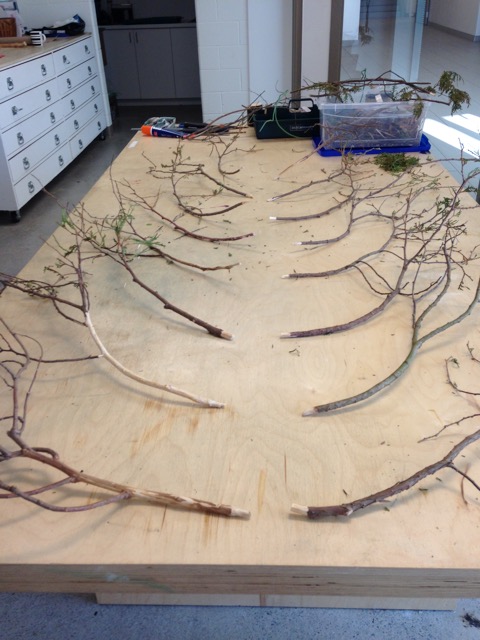
Sally Thurlow: Day 3 …pruning branches… still more pruning to do
RMG: What materials do you work in?
ST: I work in a multi-disciplinary way to make the work in whatever way I feel suits, using whatever kind of materials relate to the work. For this sculpture I will be using a discarded Christmas tree trunk which I had already worked on for another idea but have decided it could be better used for my present idea. Also, freshly cut cedar branches (from my hedge) that I am denuding of the cedar greenery and I am steaming, staining, and attaching to this tree in a particular form which has already been viewed as insect-like because of the way I have pruned the branches bringing out innate equivalences between all living things.
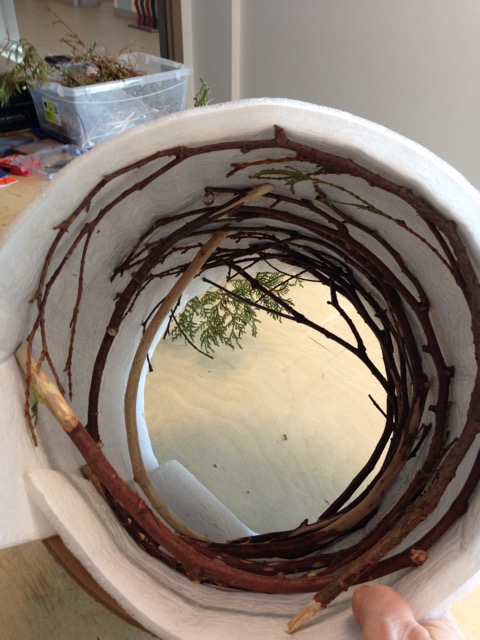
Sally Thurlow: Day 4 …bending branches after soaking them in very hot water
RMG: Can you please tell us a bit about your artwork in IRIS at 20, on view in Gallery A?
ST: This exhibition is highlighting numerous “souvenirs” which women have offered over 20 years of International Women’s Day events we have held in various community places. The artists have each chosen a souvenir to respond to and since I had given a little extra paper canoe from my solo Canoe Dreamings show, and had shown this fibreglass vessel earlier empty, I decided to show it with my new work in it. The environment, and a sense of responsibility to its well-being has been a constant part of my life, and art-practice. Since I have long been exploring the dynamic range of natural shapes using driftwood, I spend considerable time on beaches and they all have plastic debris. While I pick driftwood, I pick garbage. Other life forms are also attracted to these appealing colours and forms, ingesting the broken down bits and absorbing their poisons. Within this illuminated translucent boat form, its lacy edges mimicking the frothy tide, the plastic debris placed inside may simply remind us of pretty kaleidoscope bits. But in a personal narrative written on disposable plastic wrap (part of the dilemma), I question our cultural and environmental practices reflected in our exploding throw-away societies. The abundance of plastic bits in my vessel functions to partially obscure the message just as the monstrous plastics problem is partially hidden by being out in the middle of the oceans, even though some of these giros of plastic are twice the size of Texas. They are often brought there by enormous container vessels.
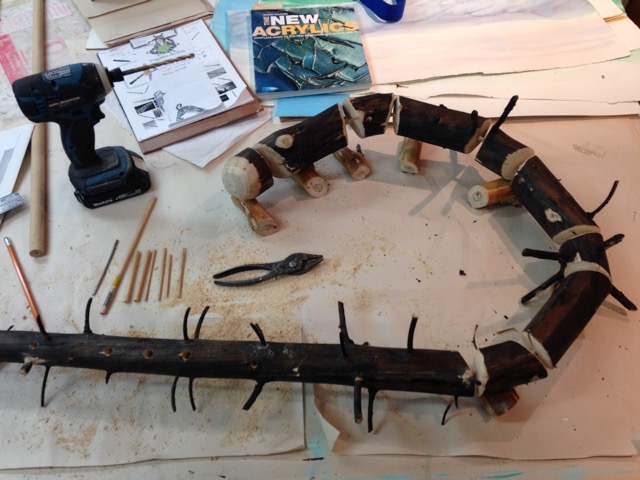
Sally Thurlow: Day 7 …having cut the trunk in segments and drilled into each to fit a dowel
RMG: What inspires you? Is there a particular artist’s work that has influenced your practice?
ST: Walking beaches, experiencing life and death in the raw, the power of the water, what it hides and exposes, my children… so much inspiration. There are many artists whose work I admire. I grew up across the road from Elizabeth Wynwood Hahn and her husband Emanuel Hahn – both important Canadian sculptors whose work can be found at the AGO, the National, other galleries and in public places. Elizabeth wrote “Sculptural form is not the imitation of natural form any more than poetry is the imitation of natural conversation… It is the juxtaposition of masses in space,… a clarification of experience.” That speaks to me as my work comes from my gut, my experiences. Louise Bourgeois, Andy Goldsworthy, Betty Goodwin, Jenny Holzer, Anselm Kiefer, Suzy Lake, Gerhard Richter, and many more, all have such different, brilliant artistic expressions that I admire.
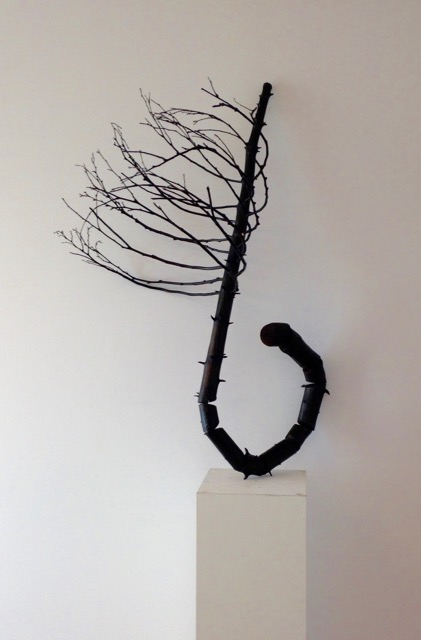
Sally Thurlow: Day 9 …branches stained and inserted, shortened branches to spikes, still lots to do, mostly details
Artist Biography:
Sally Thurlow is a multidisciplinary artist based in Greater Toronto. For some years she has been exploring the dynamic range of figurative forms using driftwood, within a wide range of other media. The questioning of our cultural and environmental practices is a constant focus of her work. She holds a BA in Fine Arts from the University of Toronto, with courses in Cultural and Environmental Studies at Trent University and significant earlier studies at OCA. She has given numerous artist talks and workshops at educational institutions and public galleries.
Her work has been shown internationally and she has been the recipient of various Ontario Arts Council awards. She is a member of the IRIS Group and the Red Head Gallery artists’ collectives. Her work is held in private collections across Canada, and at The Robert McLaughlin Gallery in Oshawa, Ontario.
For more information please visit sallythurlow.com
